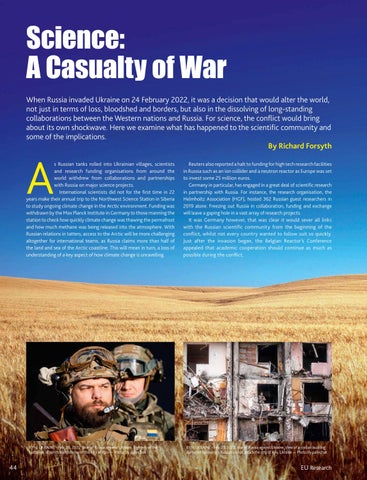Science: A Casualty of War When Russia invaded Ukraine on 24 February 2022, it was a decision that would alter the world, not just in terms of loss, bloodshed and borders, but also in the dissolving of long-standing collaborations between the Western nations and Russia. For science, the conflict would bring about its own shockwave. Here we examine what has happened to the scientific community and some of the implications. By Richard Forsyth
A
s Russian tanks rolled into Ukrainian villages, scientists and research funding organisations from around the world withdrew from collaborations and partnerships with Russia on major science projects. International scientists did not for the first time in 22 years make their annual trip to the Northwest Science Station in Siberia to study ongoing climate change in the Arctic environment. Funding was withdrawn by the Max Planck Institute in Germany to those manning the station to check how quickly climate change was thawing the permafrost and how much methane was being released into the atmosphere. With Russian relations in tatters, access to the Arctic will be more challenging altogether for international teams, as Russia claims more than half of the land and sea of the Arctic coastline. This will mean in turn, a loss of understanding of a key aspect of how climate change is unravelling.
KYIV, UKRAINE - Feb. 26, 2022: War of Russia against Ukraine. Fighters of the battalion of territorial defense of the city of Kyiv — Photo by palinchak
44
Reuters also reported a halt to funding for high tech research facilities in Russia such as an ion collider and a neutron reactor as Europe was set to invest some 25 million euros. Germany in particular, has engaged in a great deal of scientific research in partnership with Russia. For instance, the research organisation, the Helmholtz Association (HGF), hosted 362 Russian guest researchers in 2019 alone. Freezing out Russia in collaboration, funding and exchange will leave a gaping hole in a vast array of research projects. It was Germany however, that was clear it would sever all links with the Russian scientific community from the beginning of the conflict, whilst not every country wanted to follow suit so quickly. Just after the invasion began, the Belgian Reactor’s Conference appealed that academic cooperation should continue as much as possible during the conflict.
KYIV, UKRAINE - Feb. 25, 2022: War of Russia against Ukraine. View of a civilian building damaged following a Russian rocket attack the city of Kyiv, Ukraine — Photo by palinchak
EU Research






















